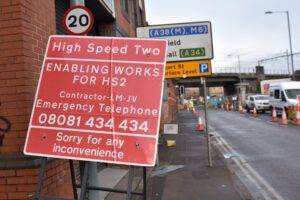
A scathing report from parliament’s spending watchdog has raised “urgent unanswered questions” regarding the cancellation of the northern leg of HS2, criticising the government’s understanding of the high-speed railway’s future operations.
The Public Accounts Committee of MPs highlighted concerns that the remaining London-Birmingham line would offer “very poor value for money,” with projected costs expected to far outweigh benefits. The decision to divert £36 billion into alternative transport schemes, including Network North, was met with skepticism.
The report underscored several unknown ramifications, including the impact on promised rail schemes and the disposal of land acquired for the northern extension beyond Birmingham.
Crucially, the Department for Transport (DfT) lacks comprehension of how HS2 will function as a functioning railway following recent alterations, particularly concerning connectivity to the west coast mainline and the limitations posed by track curvature on new trains.
Additionally, the decision to seek private investment for the final stretch into London Euston and station redevelopment was met with skepticism by MPs, who questioned the plausibility of securing private funding.
Chair of the committee, Meg Hillier, expressed concern over the government’s commitment to a project with soaring costs, especially after the decision to curtail the northern leg.
The final costs of HS2 remain uncertain, with current estimates for the London-Birmingham line reaching £67 billion, significantly higher than the initial budget. HS2 Ltd emphasized ongoing efforts to control costs and implement programmatic changes.
The DfT defended its plans, citing extensive private sector support for the Euston project and reiterated its commitment to delivering HS2 cost-effectively.
In response to the cancellation, independent plans are being developed by mayors Andy Street and Andy Burnham to enhance connectivity between West Midlands and Manchester.
Despite challenges, construction milestones for HS2 Phase One continue, with progress on Birmingham’s Curzon Street station and significant advancements in tunnel excavation.
Henri Murison of the Northern Powerhouse Partnership criticized the decision, emphasizing the economic importance of the northern sections of HS2.
The future of HS2 remains uncertain, with stakeholders grappling with cost challenges and operational complexities amidst ongoing developments in Britain’s transportation landscape.
Read more:
Parliamentary Report Criticises HS2 Northern Leg Cancellation Raising Operational Concerns





